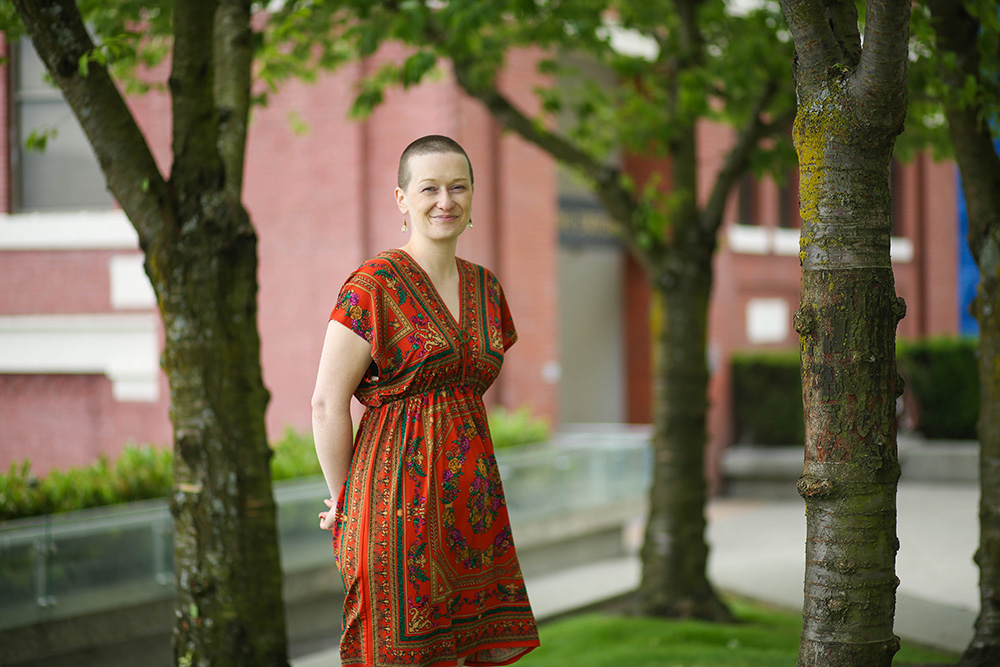When The Tyee’s Katie Hyslop, who will be recognized on Feb. 28 by the child advocacy coalition First Call for her sensitive and insightful coverage of society’s most vulnerable members, first came to British Columbia a decade ago, she discovered a fact that still disturbs her.
An upbringing in Newfoundland and Labrador had left the newly enrolled graduate student in UBC’s journalism program steeped in her home province’s deeply felt narrative of being mistreated by the rest of Canada.
“Part of growing up in Newfoundland is that I believed we were the people in Canada who’d gotten the bum’s rush,” Hyslop recalls. “So when I moved to B.C. a couple of things struck me, one being that the child poverty rate in B.C. was so much higher than it was in Newfoundland, and then finding out part of the reason for that is because it’s mostly Indigenous people [in poverty].
“That’s what struck me: these are people who, no offence to Newfoundlanders, have gotten a much worse deal in Canada, and were actively lied to, and lied about, and cheated through colonization. Basically, I was shocked that there were people who are treated worse than Newfoundlanders. And I thought people should know about that.”
She says it with a wry laugh, but Hyslop has spent much of her time since then doing just that. Since joining The Tyee as a part-time education reporter shortly after graduating from UBC, she has amassed a peerless record of reporting, ranging from intimate accounts of the experience of youth left homeless after “aging out” of foster care, to meticulously researched multi-part series on difficult but urgent problems, like the invisible crisis in Indigenous child welfare captured in the abysmal fact that more than half the children under the age of 15 in Canada’s foster homes are Indigenous, a group that constitutes only eight per cent of all kids of that age.
(Disclosure: it was my pleasure to edit some of those stories until 2017.)
It’s that body of work that has now earned Hyslop the First Call child advocacy coalition’s “Champion of Child and Youth Rights Award” for 2019. The coalition’s more than 100 member groups promote child well-being and successful transitions from youth to adulthood “through public education, community mobilization and public policy advocacy,” according to its website.
First Call’s British Columbia co-ordinator, Adrienne Montani, credits the distinction to the “depth, breadth and longevity” of Hyslop’s coverage of education, foster care, Indigenous issues, housing, and strategies to end poverty.
“Katie does her homework, I trust her numbers,” Montani says, one reason Hyslop’s stories so often find their way into her organization’s own files and communications material. Her reports “bring faces and stories to policy issues,” Montani says. “She illustrates it really well.”
While growing up in Newfoundland and Labrador may not have prepared her for the realities of poverty and systemic racism in British Columbia, Hyslop says it did motivate her interest in social justice journalism.
“I do subscribe to the belief that journalism is there to afflict the comfortable and comfort the afflicted,” she says. And “part of it is definitely growing up in Newfoundland, and hearing either from the news or from my family about how hard-done-by Newfoundland is. And to a large degree that’s true. It gave me an understanding of the injustices in the world and how often they’re created by things that are done behind closed doors.”
Her chosen beat is strewn with injustices, and with innocent young victims on whom society has too often closed its doors. The work of bringing their stories to light “can really, really, be a downer,” Hyslop concedes. Acutely aware from her reporting of Canada’s Indigenous child welfare crisis, she says for example, “I find I’ve lost patience with people who say, ‘I didn’t know that was a thing.’” Her Tyee biography confides that she finds a dark release in a growing collection of horror comics.
But she has also met heroes. “Such persistent people, who are fighting for justice, or a changed child welfare system, a changed education system. These are people who’ve experienced systemic racism their whole lives, who might have been abused in care, or lost their children, and yet they keep pushing, they keep organizing, they keep speaking out. I find those people really inspiring.”
“And sometimes putting their story out there helps them,” she says.
“For example, Patricia Dawn." The Duncan single mother started an informal network of women to support parents in the Cowichan Valley who are dealing with the Ministry of Children and Family Development, particularly in child removal cases.
“I honestly don’t know how she finds the energy or the strength to keep going,” Hyslop marvels. “But once that story came out, it seems she’s getting more support and it really seems to be gelling. And it’s not just because of my story. There are other people in the community who are fighting for it as well; there were things in the works already. But I think the story has really helped propel that along.
“So, I find inspiration from people like that, and if I can help elevate their story in any way I also feel a bit better about doing what I do.”
Afflicting the comfortable. Comforting the afflicted. It’s the work of good journalism. ![]()
Read more: Indigenous, Media
















Tyee Commenting Guidelines
Comments that violate guidelines risk being deleted, and violations may result in a temporary or permanent user ban. Maintain the spirit of good conversation to stay in the discussion.
*Please note The Tyee is not a forum for spreading misinformation about COVID-19, denying its existence or minimizing its risk to public health.
Do:
Do not: